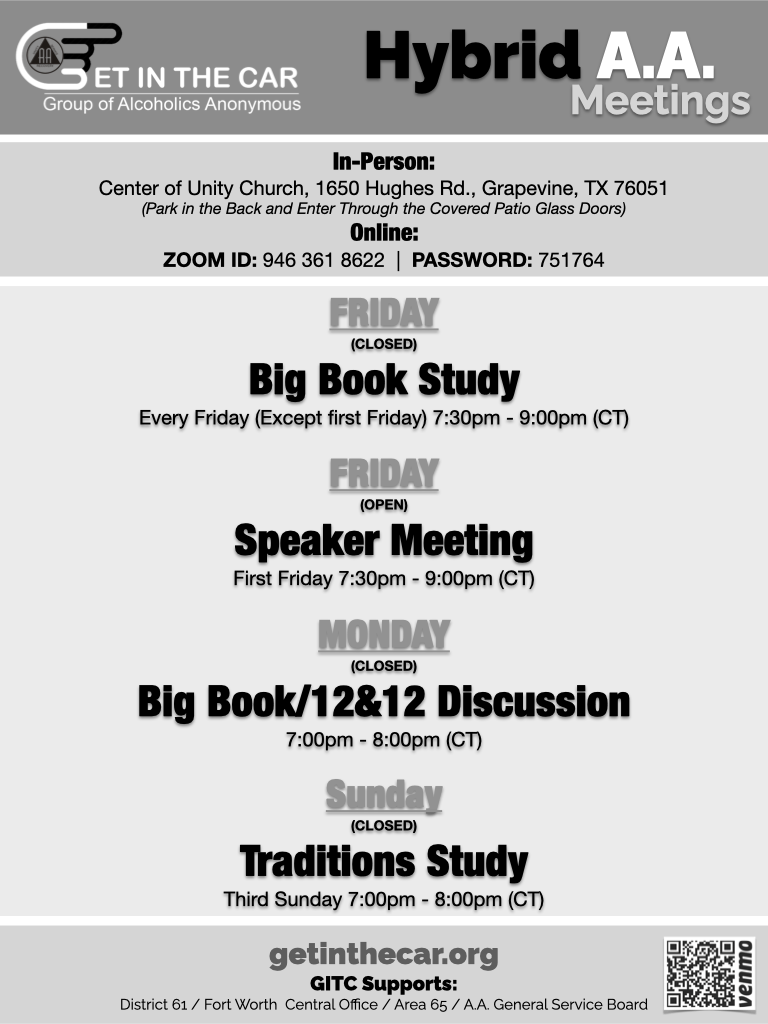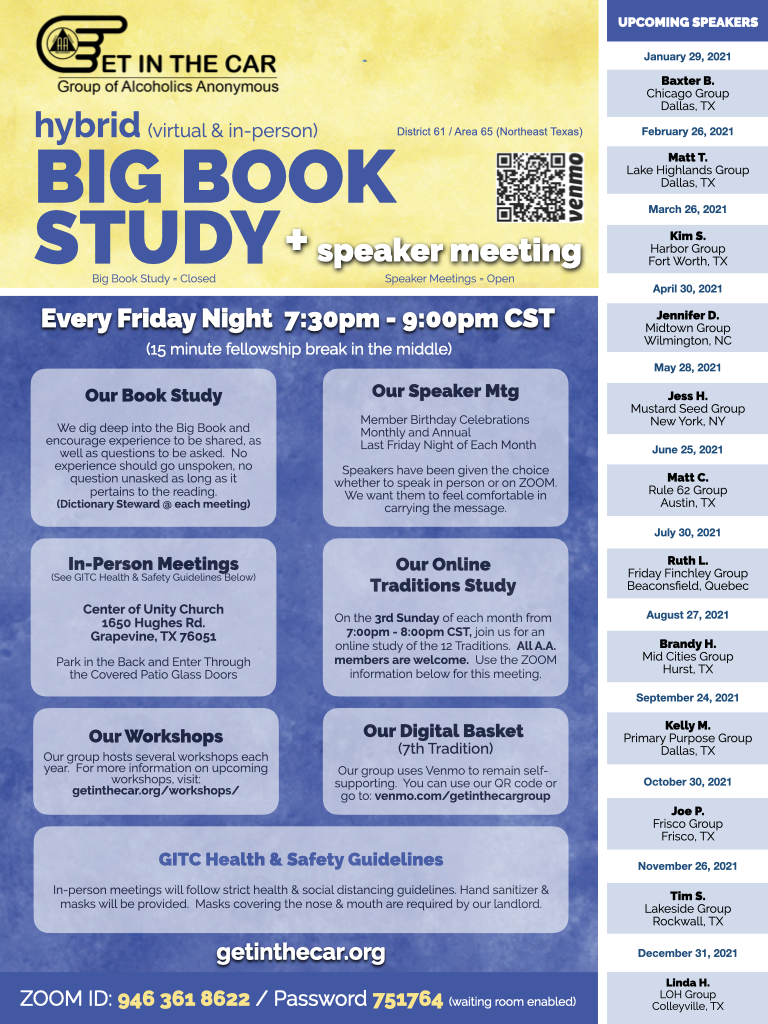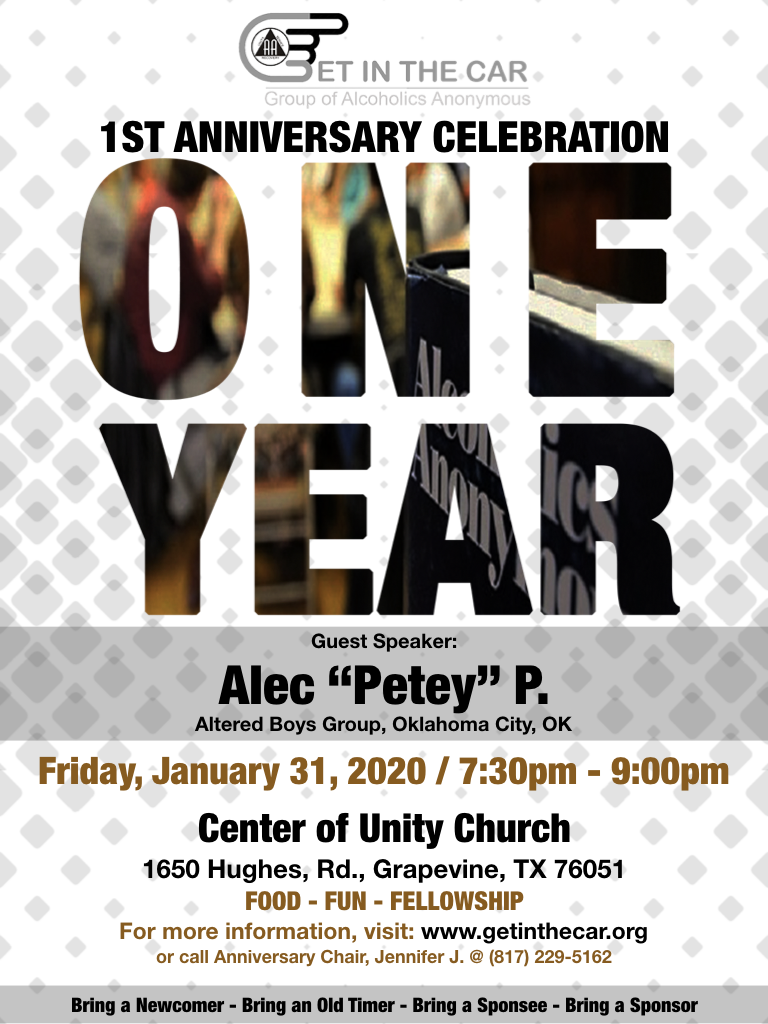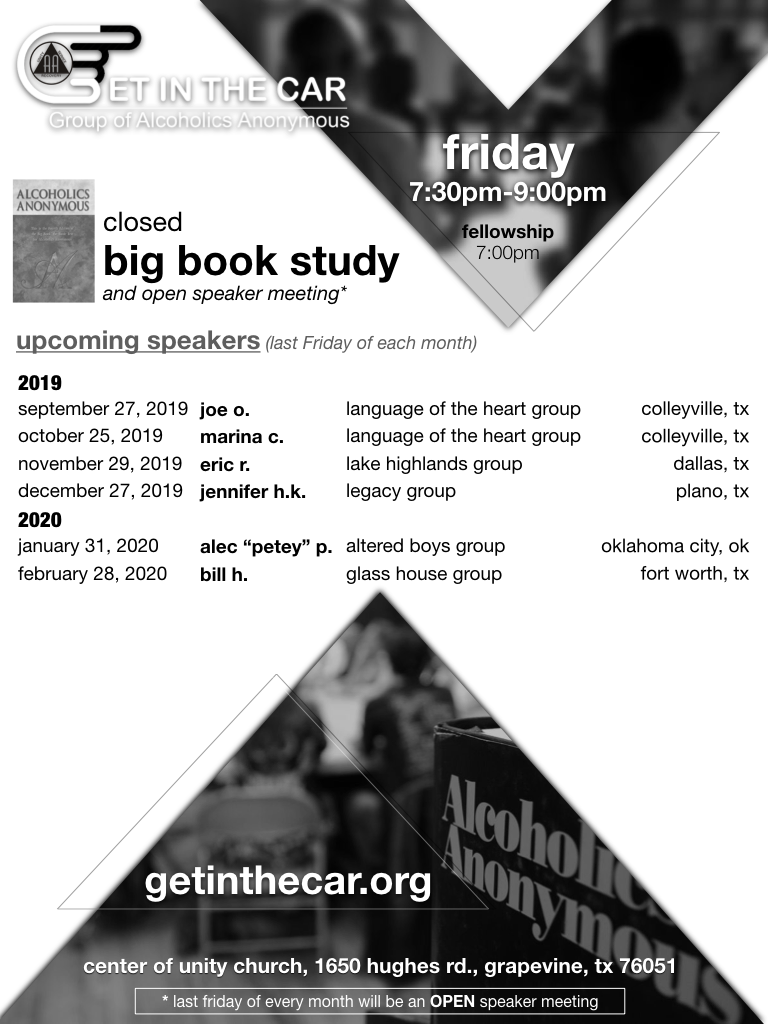GITC is changing up it’s schedule starting in 2023 and moving our speaker meeting and member birthday celebration to the FIRST FRIDAY of each month to celebrate the member’s birthdays from the previous month. In January 2023, that first Friday will also be our 4th Annual Group Anniversary. We hope you can join us.
GITC Has Made Changes
August Newsletter

Greetings from the Get In The Car Group of A.A.
https://getinthecar.org
News From Our Group and Around A.A.
|
|
|
|
|
|
|
What Is My Experience of a Spiritual Experience?
By Rick W.
Let me start off by sharing what our books tells us one looks like:
“Here and there, once in a while, alcoholics have had what are called vital spiritual experiences. To me these occurrences are phenomena. They appear to be in the nature of huge emotional displacements and rearrangements. Ideas, emotions, and attitudes which were once the guiding forces of the lives of these men are suddenly cast to one side, and a completely new set of conceptions and motives begin to dominate them.”
“the personality change sufficient to bring about recovery from alcoholism”
“a profound alteration in his reaction to life; that such a change could hardly have been brought about by himself alone.”
Now, if you are anything like me, the first time you heard the phrase “spiritual experience” as a newcomer, you might have cringed just a little. Like so many who come to the rooms, I came in with some background (yeah, I’ll just call it that instead of “baggage”) about God. Anytime I heard the word spiritual, my twisted brain immediately went to God, and at that time, the next thought was church, and then the next thought was…. I’m outta here. I had had a somewhat negative experience with organized religion that I simply wasn’t ready to embrace anything (even if it looked like it might save my life) that was even remotely related to church.
I’m grateful today that I’ve had some incredibly wise and loving men and women in my life who told me to come all the way in, sit all the way down and shut all the way up. These amazing members of the Fellowship showed me, both through the teaching of the book and through their own example that the chapter We Agnostics provided me the road map to begin to reimagine what a Higher Power could look like for me. They began to teach me that I got to wipe the slate clean and start over if I wanted to – and boy did I ever want to when I finally learned I could.
One of the biggest aha moments I’ve had though was when I had a sponsor point out to me that in the first paragraph of page 567 (4th Edition) what Bill’s definition of a spiritual experience was. It was only two words – personality change. He went on to point out that the word God was nowhere in that first paragraph which was just fine by me. Of course, he did point out that further on down the page, Bill starts to use the word God – but in the actual definition, the word God was nowhere to be found. What a relief that was. I mean, it was hard to embrace the idea that the word spiritual (connected to the word experience) did not immediately use the word God as part of its definition.
Once I finally wrapped my arms around that, then, I had to begin to open up to what a personality change was going to look like in my life. That’s where the other writings above came in. I wasn’t all that sure what a “huge emotional displacement” was, but it wasn’t that big a leap for me to see what “ideas, emotions and attitudes that were once the guiding force of my life” were. In looking back at my life prior to coming to the rooms, I could see that every single decision I made in my life before A.A. was fraught with very twisted ideas, massively screwed up emotions, and incredibly bad attitudes. I was being taught that if I was ever going to have any hope of becoming a recovered alcoholic (which our book tells us we can and will become once we’ve experienced this personality change), those things had to be cast aside so that a new set of conceptions and motives could take over.
In my experience, I’ve found what our literature goes on to tell us will happen to be true. I’ve experienced a profound alteration in my reaction to life and in the manner in which I live my life. The amount of acceptance I have today for all of the things that are going on around me (in a COVID-19 world) honestly blows my mind. I don’t find it necessary to get involved in all of the political arguments that I used to revel in; I am much better today at loving people right where they are instead of placing unrealistic expectations on them like I used to; and if my 113 over 64 consistent blood pressure reading is any indication of the peace and calm I feel today – I have not one iota of fear about my future. It’s clear to me today that this profound alteration could not have come about as a result of anything I could do on my own – it was way above my paygrade. And while Bill’s definition of a spiritual experience is a personality change, today, I know that that personality change only came as a result of remembering that somewhere along the line I took Step 2 and came to believe in a Power that was much greater than I – and then took Step 3 and turned over my ideas, emotions and attitudes to that Power.
I am so very grateful that the way Bill eased me into it was by simply stating in no uncertain terms that I needed to change (the same man will drink again). For some reason, THAT made sense to me. As I embraced that change, I began to become more and more comfortable with the idea that that change did not come from me, but from a loving God who only wants the best for me. So today, when I am told that I must have vital spiritual experiences to get, keep, and give away this precious gift that was given to me – I interpret that as I must have vital personality changes that WILL provide a profound alteration in the way I react to my life.
What Is the Difference Between Delusion and Denial?
By Rick W.
I was sitting in a meeting last night and we were having healthy discussion on the topic, “what I wish someone had told me when I was a newcomer that I know now” (one of those, “I wish I’d known then what I know now” kinda things). One of the women shared that she wished she had been taught the difference between “delusion” and “denial.” She struggled with that for a long time. As she was sharing, I found her statement very interesting and had to ask myself if I knew the difference. So, I went to the dictionary as I often do to find the definitions of the two and shared them with the room. The conversation went on and some really great discussion occurred.
After the meeting, I was left wanting more of that conversation as a teachable moment for myself, so I reached out to a handful of people in my A.A. network to see what their experience (not opinion, but experience) was on the topic. The linked document below represents a collective sampling of the responses I got from a variety of folks (all who have varying levels of time [some 30+ years] in the Fellowship – and who have varying levels of service, both at the group level and below the group level [in the General Service structure all the way down to the Board of Trustees]).
I hope you find it as interesting as I did as you begin to ask yourself the title question of this writing.
(Heads Up: There are some “outside issues” used herein by one person as they shared their experience.)
REDELA (Meeting of the Americas) September 29-October 3, 2019
Dear Members of A.A.,
I‘m privileged to present this report on the 21st Meeting of the Americas (REDELA) held September 29 – October 3, 2019, which Newton P. and I, as Trustees-at-Large and World Service Delegates, attended on behalf of the General Service Board. REDELA is an acronym for Reunion de las Americas. The theme this year was “Serving Together to Reach Our Goal”. The bi-annual REDELA is an opportunity for the countries in our World Zone – which includes Canada, the United States, Mexico, Central America and South America – to come together to share experience, strength and hope as service structures. There are 35 member countries and the attendance this year was 20 delegates representing 17 countries.
This year’s REDELA was held in Buenos Aires, Argentina. The Argentinian General Service Office is located there, and Newton and I got the opportunity to meet with the Board at their office ahead of the REDELA, and also were able to visit it with the other Delegates some days later. They moved there just over a year ago, and now have a Board room, a literature depot and a large front meeting room. All of the members of the Board – Regional Trustees, Class A Trustees, General Service Trustees and the GSO General Manager were there to meet with us, with the exception of their President who was at a professional conference the day we first visited.
There was a pre-REDELA event that the local fellowship was invited to attend, with a series of four panels, which was very successful event. One of the panels was on Women in Service, an important topic at this gathering and at the REDELA. There was only one other woman Delegate at the REDELA, Maria from Brazil, and of course we were both part of that presentation, as was our GSO International staff person, Eva S. We are able to set a powerful example in our US/Canada service structure, with the Chairs of the General Service Board, AAWS and Grapevine all being women, and with the composition of our current General Service Board: 50% of the Regional, General Service Trustees and Trustee’s at Large are women, and 70% of the Class A Trustees are women. There was appreciation for those statistics and what they represent.
Country highlights, sharing sessions, panel discussions, and workshops-presentations – all of them were filled with a passion for Alcoholics Anonymous, and how to keep it thriving in home countries. There were heart-rending moments – the delegate from Venezuela literally risked his life to attend the REDELA. He wasn’t even certain how he was going to get back across his border. He faces criticism from within the fellowship for attending the REDELA and for working so hard to keep a viable service structure going. As you know, Venezuela is in a period of serious instability, and of course that affects AA as well. Membership is falling as people leave the country. Getting literature into the country is impossible. There’s no money to print literature as inflation keeps climbing. But by coming to the REDELA, Nicolas was able to reach out to the zone as a whole, and to the delegates as individuals, to share and receive support. And, he was able to meet with Newton and I who were able to, on your behalf, try and support him as he tries to keep the AA lights on in his country. He was also able to meet with Eva and David to work out a plan to use the International Literature Fund to creatively get some literature safely into the hands of the fellowship. That would not have happened without the REDELA.
All of the Delegates were given the opportunity to visit the General Service Office of Argentina, and it was a wonderful gathering. The staff and volunteers were warm and gracious hosts, and gave the participants the opportunity to hear and see the history of AA in Argentina. That warmth and generosity pervaded every aspect of the REDELA. The (quite small) organizing committee were constantly striving to make sure every need was met, and basically gave up their lives for the duration of the event in order to be of service. And yet, I got the sense that they did not want it to end.
One aspect of the experience that I found particularly important was the flowing of information between countries, ALL countries, and how much we have to learn from each other. Countries are finding remarkable resourcefulness in finding ways to carry the AA message, and to put structures in place that both serve their specific needs and can inspire new ways of approaching some of our shared challenges. I am humbled to have been there to learn so much, and to witness that love of Alcoholics Anonymous.
In love & service
Trish L., Trustee-at-Large (Canada)
General Service Board of Alcoholics Anonymous
The Meeting Guide App

 This is the first installment of a new Box 4-5-9 series on the technology that is changing the way Alcoholics Anonymous communicates to suffering alcoholics and interacts with its members.
This is the first installment of a new Box 4-5-9 series on the technology that is changing the way Alcoholics Anonymous communicates to suffering alcoholics and interacts with its members.
Josh R., a web developer, did most of his drinking in New York City. In 2013, he decided a geographic would help and he moved to San Jose. Unlike most geographics, this one turned out to be fruitful — for both Josh and for Alcoholics Anonymous.
Once in San Jose, Josh got sober, found a sponsor and started going to A.A. meetings in the area. Only problem was, the local central office website — while it listed meetings — wasn’t so user-friendly for someone using a mobile phone. Like most A.A. websites, the site had been developed before mobile design came into general use. Such sites work fine for someone on a computer, but these days, A.A. sites get more than twice as many visitors from handheld devices as from traditional desktops or laptops.
“Essentially what I did,” Josh says, “is take all the meet- ing listings and export them to an Excel file with links to directions, and then made my own little app, just for myself. That’s where the germ of the idea for the Meeting Guide app developed — just me trying to find meetings.”
From early sobriety, Josh has been a supporter of intergroups and central offices. The intergroup rep from his home group suggested that Josh develop his person- al app into an app that all A.A.s in Santa Clara County could use. Josh agreed and conferred with the Santa Clara County central office.
Eventually, Josh went further than originally envisioned. He came up with the idea to develop a WordPress plug-in that intergroup/central offices, areas and districts across the country (and the world) could use, so that the meetings they listed on their sites could be added to the app and automatically updated every 12 hours.
A turning point for Josh was making a presentation of his app to the National A.A. Technology Workshop (NAATW), where he received support and feedback. The free app was launched in November 2015 with seven connected A.A. websites — those in Austin, Mesa (Arizona), Oakland, Philadelphia, Portland (Oregon), San Francisco and San Jose.
Today, Meeting Guide is connected to 326 local A.A. organization websites. Getting connected wasn’t easy for all of them. Some local sites had to find new web servants, while others had to draft new policies and procedures, sign up for new web hosting, and try new soft- ware. In several cases, group consciences were sought to settle concerns about the Sixth Tradition and the future of the app: Would it always be free? Does this represent affiliation with an outside entity?
In an era when smartphones dominate, Meeting Guide is a simple, useful tool for newcomers and oldtimers alike — one that standardizes meeting information so that it is always readily available and up to date. Recognizing this, Josh did something unusual, but which is also completely within the spirit of the Fellowship: he gave the Meeting Guide app to Alcoholics Anonymous, for free.
“I realized,” Josh says, “that the only way we could continue to grow was to pass it on.”
In the fall of 2018, A.A.W.S., Inc. licensed Meeting Guide and put together a working group of consultants, employees and trustees to help bring it to fruition, and an updated version was released in summer 2019. Lois L. is a member of the steering committee for the NAATW and an administrator on the Technology in A.A. (TIAA) online forum. As an A.A. member with 30 years sobriety and a professional digital strategist and user experience (UX) consultant, she also advises G.S.O. on digital matters and technical strategy. She says, “What A.A.W.S. has done by acquiring and updating the app is to enable this vital piece of technology to live on forever, to be continually updated and improved upon. Providing the app is what G.S.O. is supposed to do — which is to disseminate public information on a national level for all A.A.s. It’s also important to point out that, although the app is provided to the end user for free, it costs money and time to maintain and update — money that comes from member donations to intergroup/central offices and G.S.O. itself.”
“Meeting Guide has multiple benefits,” says Clement C., staff member on the Communication Services desk at the General Service Office. “Professionals
such as therapists and probation officers are able to use it to steer people to meetings very easily. Anytime anyone is traveling, they find the app extremely useful. One aspect I love is being able to text my favorite meetings to sponsees and to give them all the information they need to find them.”
Developed for iOS and Android, Meeting Guide is easily recognizable on G.S.O.’s website by its logo, a white fold- ing chair on a blue background. The app clearly tells the user the name and address of a particular meeting, the time it is being held, how far it is from the user’s current location, and what type of meeting it is. There are almost 110,000 meetings currently available on the app, and it currently has 186,000 monthly active users, increased from 84,000 in 2018.
“Meeting Guide is completely aligned with A.A. and was designed with a full understanding of our Traditions and Concepts,” says Beau B., a Class B (alcoholic) general service trustee and a director on the A.A.W.S. board. “It’s a great example of the right use of new technology: not walking away from who we are as a Fellowship, while allowing us to do so much more.”
Clement C. agrees, and also sees another benefit of Meeting Guide: “Having licensed the app, G.S.O. is now seeking to collaborate with intergroup/central offices — the places where the meeting information resides, after all — to keep it fully updated and make sure it continues to be a vital Twelfth Step tool. It’s a true program- wide effort.”
“I would hope that people are inspired by this and see it as a kind of service model — that you can create some technology on your own and then perhaps give it to the Fellowship,” Josh says. “I hope there are people out there who want to create, for instance, a Twelfth Step volunteer database to get out to groups who might need it. There’s a lot that we can do.”
Beau B. personally feels that A.A. is at a “tipping point” when it comes to the use of technology, of which Meeting Guide is only the first example to come to full fruition. Within a year, G.S.O. will have a new website to replace the 2014 version it currently has, one in which the search function is notoriously balky. The new site, Clement says, will “speak directly to people in a conversational way and make it easier for members and people coming to A.A. for the first time to find what they want.” Julie Gonzalez (nonalcoholic), Communications Services staff assistant, says that A.A. is “trying to do everything with current best practices. We’re listening to industry professionals and user feedback, and participating in the NAATW and Regional Forums.”
If so, it’s somehow fitting that people like Josh R., and those A.A.s who gather at NAATW conferences and online at the TIAA forum, may be the ones whose service at the local level can lead to effectiveness for carrying A.A.’s message to anyone, anywhere, who reaches out, or clicks, for help.
“After five years of attending NAATW conferences,” Lois L. says, “you start to see what people all over are doing and thinking about on their own. Much of what people are doing is experimental. Which is fine. The Traditions and Concepts support that. Let’s try new things, and if they don’t work, we’ll try something else.”
Part Two of this series will continue in the Winter 2019 edition.
Leadership in A.A. – Ever a Vital Need
At our group’s recent workshop on the “12 Concepts of World Service,” our moderator Tom M. talked about an article Bill W. wrote to the Grapevine in April 1959 titled, “Leadership in A.A. – Ever a Vital Need.” This article is also published in our A.A. Service Manual in Concept 9.
For anyone who does service in A.A., it is a MUST read article. ENJOY!
GITC Celebrates One Year
On January 4, 2019, an amazing group of people came together for the first time to attend the inaugural meeting of the Get In The Car Group of Alcoholics Anonymous. It was a beautiful night.
We are excited to celebrate our first anniversary on Friday night, January 31, 2020. We’ve invited a truly dedicated A.A. servant from the Altered Boys Group in OKC, Alec “Petey” P., to come down and speak at this meeting. It seemed appropriate to invite him to speak that night because his home group was the foundational inspiration to our group format.
We hope you will plan on joining us for an evening of fun, food and fellowship as we continue to try and carry a “clear and adequate presentation of our program” to all who join us that night.
Our undying gratitude goes out to everyone who has helped make GITC a wonderful experience of our Big Book as we continue to carry its message to the still suffering alcoholic.
In love and service,
Aaron P, Terry C. and Rick W.
GITC Founders











